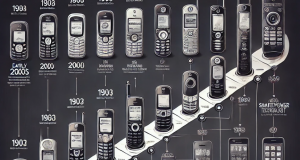In today’s fast-paced business environment, staying ahead of the competition requires more than just intuition – it demands data-driven decision-making. Mobile market research has emerged as a game-changing tool for companies looking to gain deeper insights into consumer behavior and preferences. This article explores how mobile research methods are transforming the landscape of business planning and strategy.
The Rise of Mobile Market Research
Mobile devices have become an integral part of our daily lives, and market researchers have been quick to capitalize on this trend. The evolution of mobile market research can be traced back to the early 2000s, but it wasn’t until the widespread adoption of smartphones that the field truly took off.

Dr. Sarah Chen, a leading expert in digital consumer behavior, explains: “The ubiquity of smartphones has opened up unprecedented opportunities for real-time, in-context data collection. We can now reach consumers at the exact moment of decision-making, providing invaluable insights for businesses.”
Key Mobile Research Methods
- Mobile Surveys: These are perhaps the most common form of mobile market research. Short, engaging surveys can be delivered directly to consumers’ smartphones, allowing for quick and convenient participation.
- Location-Based Research: By leveraging GPS technology, researchers can trigger surveys based on a participant’s location, providing context-specific insights.
- Mobile Ethnography: Participants can use their smartphones to document their experiences through photos, videos, and voice recordings, offering rich, qualitative data.
- In-App Analytics: By integrating research tools directly into mobile apps, companies can gather behavioral data and user feedback seamlessly.
- Mobile Focus Groups: Video conferencing technology allows researchers to conduct focus groups with participants from diverse geographic locations.
Transforming Business Planning
The integration of mobile market research into business planning has revolutionized how companies approach strategy development. Business plan writing experts now routinely incorporate mobile research findings to strengthen their proposals and projections.
Enhanced Customer Profiling
Mobile research allows for more accurate and nuanced customer profiling. By collecting data on consumers’ mobile behaviors, preferences, and purchase patterns, businesses can create highly targeted marketing strategies and product offerings.
Case Study: Fashion retailer Zara used mobile location data to understand foot traffic patterns around their stores. This information helped them optimize store layouts and inventory management, resulting in a 5% increase in sales.
Rapid Prototyping and Testing
Mobile research enables companies to quickly test new product concepts or marketing messages with their target audience. This agile approach to market testing can save significant time and resources in the product development process.

Real-Time Market Monitoring
With mobile research tools, businesses can continuously monitor market trends and consumer sentiment. This real-time data allows for more responsive and adaptive business strategies.
Improved Forecasting
The rich, contextual data gathered through mobile research can enhance the accuracy of sales forecasts and market projections. This is particularly valuable for startups and new ventures seeking funding or partnerships.
Competitive Intelligence
Mobile research methods can provide insights into competitors’ strategies and market positioning. By analyzing mobile app usage data or conducting targeted surveys, companies can gain a clearer picture of their competitive landscape.
Challenges and Considerations
While mobile market research offers numerous benefits, it’s not without challenges:
- Data Privacy Concerns: With increasing awareness around data privacy, businesses must ensure their mobile research practices are transparent and compliant with regulations like GDPR.
- Survey Fatigue: The ease of conducting mobile surveys has led to an increase in research requests, potentially leading to respondent fatigue and lower-quality data.
- Device Fragmentation: The variety of mobile devices and operating systems can create technical challenges in ensuring consistent research experiences across platforms.
- Data Integration: Combining mobile research data with other data sources (e.g., traditional surveys, and sales data) can be complex and requires sophisticated analytics capabilities.
Future Trends in Mobile Market Research
As technology continues to evolve, so too will mobile market research methods. Some emerging trends to watch include:
- Artificial Intelligence and Machine Learning: AI-powered chatbots and natural language processing will enable more sophisticated and personalized mobile research interactions.
- Augmented and Virtual Reality: These technologies will allow for immersive product testing and concept evaluation experiences.
- Internet of Things (IoT) Integration: As more devices become connected, researchers will have access to an even broader range of contextual data points.
- Blockchain for Data Integrity: Blockchain technology may be used to ensure the authenticity and integrity of mobile research data.
Conclusion
Mobile market research has become an indispensable tool for businesses seeking to stay competitive in today’s digital-first world. By providing real-time, contextual insights into consumer behavior, mobile research methods are enabling more agile, data-driven business planning and strategy development.
As Dr. Chen notes, “The companies that will thrive in the coming years are those that can effectively harness the power of mobile research to truly understand and anticipate their customers’ needs.”
For businesses looking to leverage mobile market research, the key is to start small, experiment with different methods, and gradually integrate mobile insights into your decision-making processes. With the right approach, mobile market research can provide the competitive edge needed to succeed in an increasingly complex and fast-paced business environment.







